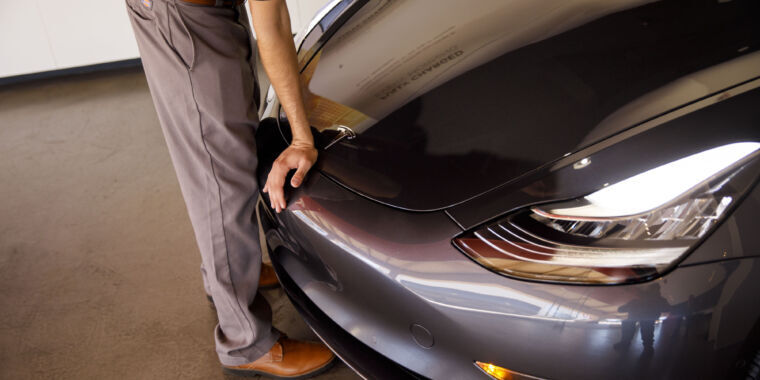- cross-posted to:
- enoughmuskspam
- cross-posted to:
- enoughmuskspam
The electric car manufacturer Tesla had to issue a massive recall this month to fix faulty hood latches that can open while its cars are driving. The problem affects more than 1.8 million cars, which means it’s slightly smaller than the recall in December that applied to more than 2 million Teslas.
The problem, according to the official National Highway Traffic Safety Administration’s Part 573 safety recall report, affects model year 2021–2024 Model 3s (built between September 21, 2020, and June 2, 2024), model year 2021–2024 Model Ss (built between January 26, 2021, and July 15, 2024), model year 2021–2024 Model Xs (built between August 18, 2021, and July 15, 2024), and model year 2020–2024 Model Ys (built between January 9, 2020, and July 15, 2024).
The problem first became apparent to Tesla in March of this year after complaints about unintended hood opening from Chinese customers. By April, it had identified the problem as deformation of the hood latch switch, “which could prevent the customer from being notified about an open hood state.”
Although the problem is with the hood latch, as with many Tesla safety recalls, the problem can be fixed with an over-the-air software patch. The new software is able to detect if the hood is open and, if so, will display a warning to the driver to alert them to stop their vehicle and secure the hood.



Ford did this. On multiple years of some vehicles the fuel injector can crack and leak fuel onto the engine and lead to a fire. Their fix is to put in a fucking drain tube to drain the fuel away if that happens rather than replace the faulty part. I’m wondering if there are any legal options to make them just replace the part rather than their half-ass non-fix.
Not even.
Ford’s fix required them to physically add parts.
This is more like if Ford just wrote a software update to detect the crack and leak, then pop up a warning that you need to pull over and “secure” the fuel.